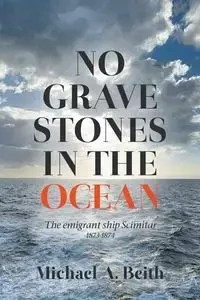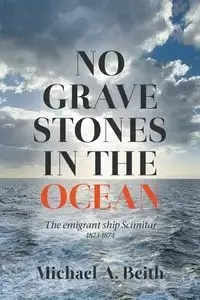No Gravestones in the Ocean - Michael A. Beith
- The emigrant ship Scimitar 1873-1874
In March 1874 an emigrant ship arrived at Port Chalmers, New Zealand, triggering a series of events that ranged from a Royal Commission of Inquiry to demands for an explanation from the UK Secretary of State for the Colonies. For several weeks emigrant ships had been arriving in the colony with disease on board and having experienced significant numbers of emigrant deaths en route. The New Zealand media reported that the means of selection and conduct of the emigrant process in England was clearly at fault and demanded action.
The arrival of Scimitar flying the yellow flag, the international signal warning of disease on board, confirmed what they already feared – that yet another ship would be quarantined and her passengers and cargo detained at extra cost and with the risk of importing contagious disease to the young colony. There was also a reputational cost to be considered as New Zealand had embarked on an ambitious programme of expansion to its infrastructure which needed a large influx of immigrants and already incurring enormous loans to finance it. It had experienced difficulty in attracting immigrants in sufficient numbers and had just started to encourage agricultural and rural trade unions to assist in recruitment of suitable candidates.
Responsibility for emigrant selection and transportation lay with New Zealand’s first diplomat, Dr Isaac Earl Featherston resident in London. Since 1871, when he began his quest for emigrants, he had received frequent criticism of his management style and now he was firmly in the firing line to take the blame. His prime adversary in New Zealand was no less a person than the Premier himself, Julius Vogel CMG, architect of the expensive colony development plan.
This book examines the Scimitar story from before she set sail, including the daily account written by her captain, James Fox, full details of the Royal Commission of Inquiry and of the evidence submitted to it. The repercussions of the Inquiry’s conclusions resulted in a stream of letters and reports between New Zealand officials, UK institutions and others accused of hindering the safe passage of emigrants. The Commission’s report revolved around the evidence of Scimitar’s surgeon-superintendent, Dr. William H. Hosking, who contested the manner in which his evidence was used and recorded. The book reveals how the poor working relationship between Julius Vogel and Dr. Featherston delayed improvements to the emigration process.
EAN: 9781789556308




In March 1874 an emigrant ship arrived at Port Chalmers, New Zealand, triggering a series of events that ranged from a Royal Commission of Inquiry to demands for an explanation from the UK Secretary of State for the Colonies. For several weeks emigrant ships had been arriving in the colony with disease on board and having experienced significant numbers of emigrant deaths en route. The New Zealand media reported that the means of selection and conduct of the emigrant process in England was clearly at fault and demanded action.
The arrival of Scimitar flying the yellow flag, the international signal warning of disease on board, confirmed what they already feared – that yet another ship would be quarantined and her passengers and cargo detained at extra cost and with the risk of importing contagious disease to the young colony. There was also a reputational cost to be considered as New Zealand had embarked on an ambitious programme of expansion to its infrastructure which needed a large influx of immigrants and already incurring enormous loans to finance it. It had experienced difficulty in attracting immigrants in sufficient numbers and had just started to encourage agricultural and rural trade unions to assist in recruitment of suitable candidates.
Responsibility for emigrant selection and transportation lay with New Zealand’s first diplomat, Dr Isaac Earl Featherston resident in London. Since 1871, when he began his quest for emigrants, he had received frequent criticism of his management style and now he was firmly in the firing line to take the blame. His prime adversary in New Zealand was no less a person than the Premier himself, Julius Vogel CMG, architect of the expensive colony development plan.
This book examines the Scimitar story from before she set sail, including the daily account written by her captain, James Fox, full details of the Royal Commission of Inquiry and of the evidence submitted to it. The repercussions of the Inquiry’s conclusions resulted in a stream of letters and reports between New Zealand officials, UK institutions and others accused of hindering the safe passage of emigrants. The Commission’s report revolved around the evidence of Scimitar’s surgeon-superintendent, Dr. William H. Hosking, who contested the manner in which his evidence was used and recorded. The book reveals how the poor working relationship between Julius Vogel and Dr. Featherston delayed improvements to the emigration process.
EAN: 9781789556308

